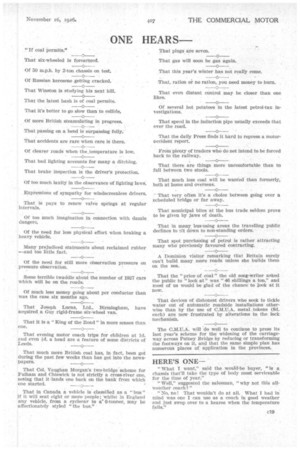ONE HEA R S
Page 41

If you've noticed an error in this article please click here to report it so we can fix it.
"If coal permits."
That six-wheeled is forearmed.
Of 50 m.p.h. by 2-ton chassis on test. Of Russian kerosene getting cracked.
That Winston is studying his next hill.
That the latest hash is of coal permits.
That it's better to go slow than to collide. Of more British steanndating in progress. That passing on a bend is surpassing folly. That accidents are rare when care is there. Of clearer roads when the, temperature is low. That bad lighting accounts for many a ditching. That brake inspection is the driver's protection.
Of too much laxity in the observance of lighting laws. Expressions of sympathy for windscreenless drivers.
That is pays to renew valve springs at regular intervals.
Of too much imagination in connection with dazzle dangers.
Of the need for less physical effort when braking a heavy vehicle.
Many prejudiced statements about reclaimed rubber —and too little fact.
Of the need for still more observation pressure on pressure observation.
Some terrible twaddle about the number of 1927 cars which will be on the roads.
Of much less money going about per conductor than was the case six months ago.
That Joseph Lucas, Ltd., Birmingham, have acquired a Guy rigid-frame six-wheel van.
• That it is a "King of the Road " in more senses than one.
That evening motor coach trips for children at Id. and even id. a head are a feature of some districts of Leeds.
That much more British coal has, in fact, been got during the past few weeks than has got into the newspapers.
That Cob Vaughan Morgan's two-bridge scheme for Fulham and Chiswick is not strictly a cross-river one, seeing that it-lands one back on the bank from which one started.
That in Canada a vehicle is classified as a " bus" if it will seat eight or more people; utilst in England any vehicle, from a cycleear to te 0-tonner, may be affectionately styled "the bus." That plugs are seven.
That gas will soon be gas again.
That this year's winter has not realry come.
.That, ration or no ration, you need money to burn.
That even distant control may be closer than one likes.
Of several hot potatoes in the latest petrol-tax investigations.
That speed in the induction pipe usually exceeds that over the road.
That the daily Press finds it hard to repress a motoraccident report.
From plenty of traders who do not intend to be forced back to the railway.
That there are things more uncomfortable than to fall between two stools.
That much less coal will be wanted than formerly, both at home and overseas.
-That very often it's a choice between going over a scheduled bridge or far away.
That municipal bites at the bus trade seldom prove to he given by jaws of death.
That in many bus-using areas the travelling public declines to sit down to non-standing orders.
That spot purchasing of petrol is rather attracting many who previously favoured contracting.
A Dominion visitor remarking that Britain surely can't build many more roads unless she builds them on the sea.
That the "price of coal," the old song-writer asked the public to "look at" was " 46 shillings a ton," and most of us would be glad of the chance to look at it now.
That devices of dishonest drivers who seek to tickle water out of automatic roadside installations otherwise than by the use of C.M.I.T.A. metal ,tokens (8c1. each> are now frustrated by alterations to the lock mechanisin.
The C.M.U.A. will do well to continue to press its last year's scheme for the widening of the carriageway across Putney Bridge by reducing or transforming the footways on it, and that the same simple plan has numerons places of application in the provinces.












































































































